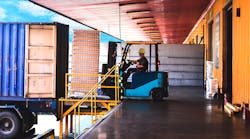Writing about flame-retardant pallets as I have the past couple of months has sparked some other fire-related — more transport than packaging — stories. A reader I met at ProMat (who shall remain nameless to protect the guilty) told me the issue of flame retardancy in pallets was all marketing smoke and mirrors. He said words to the effect that if you didn’t have a fire in your warehouse it doesn’t make any difference what kind of pallets you use.
Right. That's the point.
A more thoughtful understanding approach to the problem was brought to my attention by Paul Rowlett, president, Frommelt Products Corporation. His company, a member of the Rite-Hite family, makes products designed for the material transfer zone.
In the last century, 1998, his company began investigating the increasing number of customer-reported loading dock fires. “Since July 2001,” reports Rowlett, "we’ve documented 81 [and counting] dock seal fire incidents in a wide array of industries."
These incidents stem from dock seals and semi-trailer marker lights. Frommelt found that fire occurs when hot trailer marker lights are pressed against any make or model of compression-style foam dock seal. This compressing action creates a safety threat that can result in extensive damage to buildings, trailers and trailer contents — to say nothing of what can happen to the inside of the building, including your pallets. Rowlett conservatively estimates that there are more than 200,000 dock positions in the U.S., each a potential entry point for fire introduced via the dock seals.
What's a fire cost? If your trailer is hauling potato chips, about $24,300. If you’re hauling computer chips, about $6 million. Mary Blaser at Rite-Hite tells me there are 23,000 fires reported in U.S. warehouses every year, resulting in $531.4 million in property damage. Obviously these do not all start at the dock door. Many do, however, primarily because, until now, people were not aware of the fire potential.
"We’ve found," says Rowlett, "company decision makers are not aware of the problem and don’t know how to identify the problem. And, they find it hard to believe it could ever happen to their dock seals."
When, as part of a safety inspection, representatives from Frommelt point out undetected damage and burn marks on the seals, most people become believers.
Frommelt’s Engineering Manager, Chuck Ashelin, tells me the list of causes for these dock seal fires is a long one. Near the top of that list are relatively new enforcement policies of federal motor safety standards regarding lights; an increasing number and intensity of rear marker lights; and larger dual alternators now common in trucks.
"Under controlled lab conditions," says Ashelin, "marker lights left energized against a typical compressed dock seal head pad generate temperatures high enough [900 degrees Fahrenheit] to cause a fire in 20 minutes."
Greg Thill is a products designer at Rite-Hite with a number of U.S. and international patents to his credit. He says the company took the approach that the best way to reduce fire potential was not to give it a place to start.
"We’ve opted to use abrasion-resistant outer material," explains Thill, "along with heat-dissipating technology and a triple layer of material inside the pads, to reduce the temperatures below the auto-ignition point of the foam."
So what can you do? First thing is to check the dock seals around your doors for damage. Don't mistake fire damage for normal wear and tear. Fire damage has a cumulative effect, just like the already-burned log in your fireplace will burn quicker than a fresh log.
Some trailer manufacturers have taken notice of the problem and introduced LED-type lights that run cooler. However, there are thousands, probably millions, of older marker lights that will be with us for a long time.
Abraham Lincoln la-mented that he could not control events, but that they controlled him. Don’t let that happen to you. [email protected].


